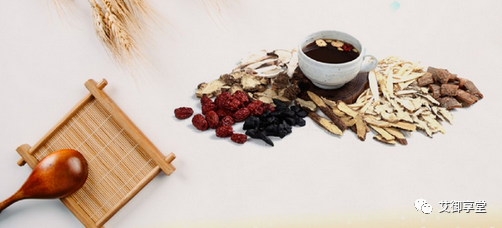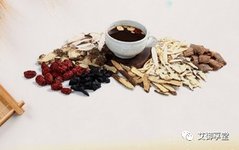Inheriting the legacy of Qi Huang, a public account with substance and warmth.
Ai Yu Xiang Tang
Some predecessors in the field of traditional Chinese medicine have mastered the use of certain herbs to an extraordinary degree, benefiting countless patients. For example, Zhang Xichun is known for his adept use of Sheng Shi Gao (Raw Gypsum), Zhang Jingyue for his use of Shu Di Huang (Rehmannia), Zheng Qinan for his use of Fu Zi (Aconite), and Qiao Yuchuan for his use of Da Huang (Rhubarb), among others.

The properties of herbs are inherent, and their proper use can save lives; improper use can cause harm. Those who view Fu Zi and Gan Jiang (Dried Ginger) as fierce beasts may fail to recognize Yang syndromes, while those who fear Shi Gao and Shu Di as if they were poison may fail to identify Yin syndromes. The methods of warming Yang can generally be divided into: 1. Warming and tonifying Heart Yang, such as Gui Zhi Gan Cao Tang (Cinnamon Twig and Licorice Decoction); 2. Warming and tonifying Spleen Yang, such as Li Zhong Tang (Regulate the Middle Decoction); 3. Warming and tonifying Kidney Yang, such as Fu Zi Tang (Aconite Decoction); 4. Rescuing Yang from reversal, such as Si Ni Tang (Frigid Extremities Decoction); 5. Rescuing Yang and unblocking Yang, such as Tong Mai Si Ni Tang (Unblock the Pulse Frigid Extremities Decoction); 6. Rescuing Yang and nourishing blood, such as Si Ni Jia Ren Shen Tang (Frigid Extremities Decoction with Ginseng); 7. Rescuing Yang and benefiting Yin, such as Tong Mai Si Ni Jia Zhu Dan Zhi Tang (Unblock the Pulse Frigid Extremities Decoction with Pig Gallbladder Juice), etc. The methods of nourishing Yin can generally be divided into: 1. Sour and sweet to transform Yin, such as Shao Yao Gan Cao Tang (Peony and Licorice Decoction); 2. Evenly tonifying Yin fluids, such as Zhu Fu Tang (Pig Skin Decoction). The application of nourishing Yin or warming Yang primarily depends on the needs of the disease mechanism, followed by the properties and dosage of the herbs. “Use this herb for this syndrome” is the principle and rule of TCM herbal medicine. For those with Yin deficiency, nourish the Yin; for those with Yang deficiency, warm the Yang, supplementing the insufficient and reducing the excessive, aiming for balance, each in its proper place. Both nourishing Yin and warming Yang require corresponding “indications for use”! However, many people do not use herbs based on “syndromes” but rather on reasoning.For example, in a murder case, if a person is a major suspect, they must have corresponding evidence to be convicted; one cannot simply conclude based on reasoning, otherwise, it may lead to wrongful convictions.
Theoretically, those with Yin deficiency are prone to insomnia, and in reality, the majority of insomnia patients do indeed belong to the Yin deficiency type. However, one cannot simply apply Yin nourishing methods upon seeing insomnia, as there are over ten different syndrome types for insomnia. To determine which syndrome the patient belongs to, a set of symptoms must serve as the basis for judgment.
For mild Yang deficiency, where the hands and feet are cold at the wrists and ankles, using Ba JI Tian (Morinda Root) and Bu Guo Zhi (Psoralea Fruit) is sufficient; for severe Yang deficiency, where the limbs are cold beyond the elbows and knees, using 100 grams of Fu Zi is also acceptable! Of course, Yang deficiency has a series of symptoms: cold body, cold limbs, pale lips and face, preference for warm food, loose stools, clear and frequent urination, lethargy, fatigue, pale tongue, and weak pulse, etc. When using warming Yang herbs, it is not necessary for all these symptoms to be present, but at least two or three symptoms should be evident as indications for use. If symptoms do not improve after taking the herbs, in 80-90% of cases, it is often due to the herbs not matching the syndrome. Of course, even if one should nourish Yin or warm Yang, it is also a matter of stages; it should be done appropriately and not continued indefinitely. But how to grasp the nuances? After taking Yin nourishing herbs, if: 1. Symptoms of thirst and dry throat have disappeared, the tongue coating has returned, and there is no desire to drink water, one should stop nourishing Yin. 2. Appetite has returned to normal but then starts to decline again, one should stop nourishing Yin. 3. Stools have changed from dry to moist but then become loose and sticky again, one should stop nourishing Yin. 4. Sleep has improved but then becomes excessive, the body feels heavy, and the legs feel weak, one should stop nourishing Yin.
After taking warming Yang herbs, if: 1. Symptoms of thirst and dry throat appear, with a desire for cold water and increased water intake, one should stop warming Yang. 2. Food intake increases, feeling hungry easily, and preferring light and watery foods, one should stop warming Yang. 3. Stools are dry and difficult to pass, or lips are dry and peeling, one should stop warming Yang. 4. Mental agitation makes it difficult to sleep, with many dreams and easy waking, feeling hot and preferring coolness, one should stop warming Yang. 5. Feeling irritable and bitter in the mouth, one should stop warming Yang. 6. After taking warming Yang herbs, if urination is yellow and hot, one should stop warming Yang. For many years, I have wanted to refine the indications for use to achieve a correspondence between formulas and syndromes, ensuring that herbal use is based on evidence (working towards “formula-syndrome theory”). However, the perfection of theory must be built on practice; if the experience is insufficient, forcing it will lead to failure. Those with Yang deficiency are prone to Yin pathogens, which are tangible entities, such as water, phlegm, dampness, and stasis; they must be completely eliminated! After removing the Yin cold pathogenic qi, whether to nourish Yin depends on the presence of indications for Yin nourishing herbs. If there are no symptoms of Yin deficiency, there is no need to nourish Yin; simply regulating the Spleen will suffice. During the warming Yang process, if a transient herbal reaction occurs, one can continue to apply strong measures. If warming Yang has been overdone, one should stop warming Yang or add Yin nourishing products. Yang generates Yin, and Yang governs Yin. If Yang is slightly more, it can generate fire and vitality, but it must not be excessive. Excess leads to surplus, and surplus qi becomes fire, transforming the generating qi into Yang pathogens!This is for clinical reference only; non-professional practitioners should not attempt acupuncture or herbal treatment.
Copyright Statement: Editor/Old Tree Proofreader/Feng Tu/Source from publicly available online materials Copyright belongs to the original author.
If you find this useful, please give a thumbs up or take a look!

